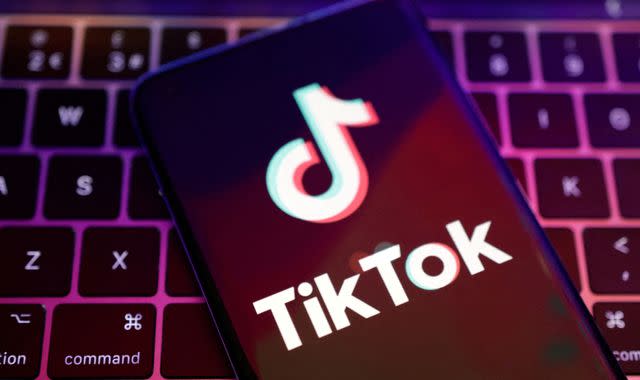Delete TikTok or risk your data being exposed to 'hostile' threats, warns foreign affairs committee chief

People have been urged to delete TikTok from their phones, with the chair of Britain's foreign affairs committee warning that "we are being naive" about the threat posed by the app.
Alicia Kearns, a Conservative MP, said that keeping the video-sharing platform installed left users' personal data exposed to "hostile" threats - specifically the Chinese government.
TikTok, which is owned by Beijing-based ByteDance, has denied such information would ever be handed over.
But Ms Kearns told Sky News's Sophy Ridge on Sunday: "It is not worth having that vulnerability on your phone.
"It is the ultimate data source for anyone with hostile efforts."
Asked if people who use the app should delete it, she replied: "Without question."
Why is TikTok so contentious?
While TikTok is hugely popular, especially with teenagers, and has more than one billion users worldwide, it has increasingly come under scrutiny over the amount of information it collects from people's phones.
In the UK, Europe, and even more so the US, where an outright ban has been mooted, concerns have been raised that this data could be accessed by the company and handed over to Chinese officials.
It comes after the revelation that ByteDance employees had used TikTok data in a bid to track several Western journalists and discover their sources. An update to the app's privacy policy also revealed some overseas staff could access user data in specific circumstances.
"Everyone should be concerned about that," said Ms Kearns.
TikTok has consistently dismissed the claims against it.
A company spokesperson told Sky News: "TikTok is enjoyed by millions of people across the UK, and we want to be clear that they can trust us with their data.
"We're taking steps like storing UK user data in our data centre operations in Ireland, starting this year; further reducing employee access to data; and minimising data flows outside of Europe.
"We have written to Ms Kearns on a number of occasions to ensure she has all the facts and information available and we look forward to having constructive engagement with her on these important issues in the near future."
In the US, where TikTok has been sued over alleged privacy breaches, the company has insisted its operation is independent of ByteDance and that users are safe.
But Ms Kearns told Sky News "we are being naive" and "have to get far more serious about protecting ourselves".
Does TikTok really harvest my data?
TikTok knows things like your IP address, what other apps you have on your phone, and obviously any sign-up information you provide like an email address and birthday.
TikTok is required to request permission to access location data and your contacts, but unlike others, it is far more reluctant to take no for an answer and will regularly prompt you if you have not done so.
Within the app, what it learns about users through their data and viewing habits powers the notoriously effective algorithm that generates an endless curated feed of short videos tuned to their interests.
It's helped turned the app into a worldwide cultural behemoth, with new online trends regularly emerging among its growing number of users.
Read more:
The growing trend of 'quiet quitting'
TikTok's 'lucky girl syndrome' explained
What is 'loud quitting' and 'rage applying'?
Despite its popularity, TikTok is facing the prospect of a ban in the US, where it has already been blocked in some schools, workplaces, and on the devices of politicians in Congress.
Democrats and Republicans last year unveiled bipartisan legislation that would ban TikTok across the US, and America's own foreign affairs committee is due to vote on it later this month.
TikTok chief Shou Zi Chew is also due to testify before the US energy and commerce committee in March.
Joe Biden has not indicated whether he would support an outright ban, a nuclear option previously attempted by former president Donald Trump, but did order a government review into foreign-owned apps.

 Yahoo Sports
Yahoo Sports 